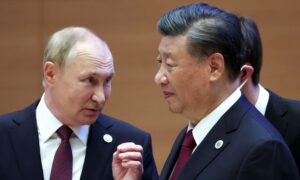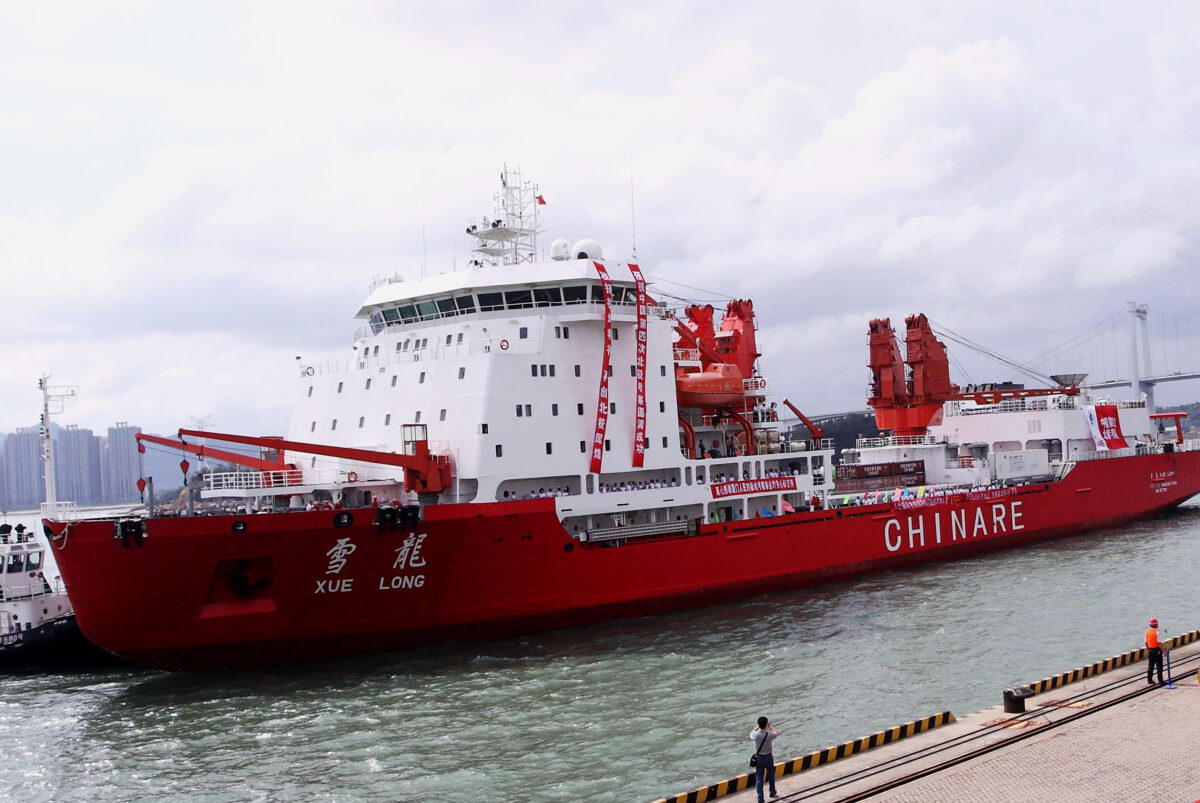Why China Won’t Turn Its Back on Russia
CommentaryDue to the ongoing war in Ukraine, the Chinese Communist Party (CCP) appears to be losing patience with Russia. Some authors claim that China could soon turn its back on Russia. Such claims, however, are untethered from reality. Here’s why. Located in the northernmost part of Earth, the Arctic region consists of the Arctic Ocean and parts of countries like Canada, Finland, Iceland, the United States, and, of course, Russia. Of the 4 million people that live in the polar region, approximately 2.5 million are Russian. Although the region isn’t officially controlled by one country, it’s unofficially controlled by Russia. To many, I’m sure, the Arctic seems nothing more than a deeply unforgiving place. To the Russians, however, it’s considered priceless—and for good reason. The Arctic is an intimidating place, but it’s also an enticing one. That’s because it has vast deposits of valuable mineral resources, including phosphate, bauxite, diamonds, iron ore, and gold. The world is currently experiencing a shortage of bauxite, a crucial raw material used in cement, steel, and petroleum. The region also has huge deposits of silver, copper, and zinc. Bloomberg has recently warned readers to brace themselves for a “great copper squeeze.” The semiconductor industry relies on copper. No copper, no chips. This fact is not lost on the CCP. As I’ve discussed elsewhere, the despots in Beijing desperately want to control the world’s rare earth elements. This is why the CCP has aspirations of looting the Arctic. According to a new research report by the U.S. think tank Rand Corporation, the CCP’s influence in the region looks likely to increase over the next decade. Obviously, influence also means access, and greater access will come through fostering closer ties with Moscow. “From China’s viewpoint, there are clear benefits to cooperating with Russia,” the report said. After all, shipping “represents more than 90 percent of China’s international trade transportation,” and “the opening of Arctic routes would reduce maritime transportation costs as well as risks in other transportation routes, alleviate China’s energy shortage, and make China a hub for transporting Arctic energy to the world.” In turn, the Kremlin would look to Beijing “for help in the realization of its Arctic development goals, including investments in energy extraction and development of the [Northern Sea Route] for commercial shipping.” The Chinese research vessel and ice-breaker Xuelong departs for the Arctic from Xiamen, Fujian Province, China, on June 27, 2010. (STR/AFP via Getty Images) For the uninitiated, the entire Northern Sea Route lies in Arctic waters and is situated within Russia’s exclusive economic zone. The importance of the route cannot be emphasized enough. Instead of having to navigate the complexities of the Suez Canal, an artificial sea-level waterway in Egypt that has become synonymous with acts of maritime piracy, the route provides a speedier, cheaper, and safer alternative. Only the most foolish would believe the “China will turn its back” narrative, especially now that Russia is busy pumping large sums of money into making the polar region more accessible and lucrative. As the magazine Russia Briefing reported in August, the Russian government recently allocated 1.8 trillion rubles (about $29 billion) to further develop the Northern Sea Route. “The main goals of the plan,” we’re told, “are to ensure reliable and safe transportation of goods and goods for people living in the Russian Far North, as well as to create conditions for the implementation of investment projects in the Russian Arctic.” As the author Tim Gibson has noted, Russia is currently building a mega port on the Taymyr peninsula, the most northerly piece of land on this deeply divided planet. This, according to Gibson, “is quite possibly the most impressive thing that Russia is building right now.” He’s right. It is. With this new project, worth about $110 billion, Russia has all but sealed its authority over the Arctic, approximately 6 percent of the Earth’s surface. The peninsula is home to priceless minerals like palladium, a precious metal used to power cars and buses. Palladium prices are currently at an all-time high. Why? Because Russia controls most of the world’s supply. The peninsula is also home to an abundance of platinum, a highly valuable and much-needed metal used to make exhaust emission control devices, otherwise known as catalytic converters. Although there’s little doubt that China’s patience with Russia is wearing thin, there’s little, if any, reason to believe that Beijing will turn away from Moscow. If anything, now that Russia needs allies more than ever and may be willing to give China unfettered access to the Arctic, there’s reason to believe that the CCP and the Kremlin will become even closer. Views expressed in this article are the opinions of the author and do not necessarily reflect the views of The Epoch Times.

Commentary
Due to the ongoing war in Ukraine, the Chinese Communist Party (CCP) appears to be losing patience with Russia. Some authors claim that China could soon turn its back on Russia. Such claims, however, are untethered from reality. Here’s why.
Located in the northernmost part of Earth, the Arctic region consists of the Arctic Ocean and parts of countries like Canada, Finland, Iceland, the United States, and, of course, Russia. Of the 4 million people that live in the polar region, approximately 2.5 million are Russian. Although the region isn’t officially controlled by one country, it’s unofficially controlled by Russia. To many, I’m sure, the Arctic seems nothing more than a deeply unforgiving place. To the Russians, however, it’s considered priceless—and for good reason.
The Arctic is an intimidating place, but it’s also an enticing one. That’s because it has vast deposits of valuable mineral resources, including phosphate, bauxite, diamonds, iron ore, and gold. The world is currently experiencing a shortage of bauxite, a crucial raw material used in cement, steel, and petroleum. The region also has huge deposits of silver, copper, and zinc. Bloomberg has recently warned readers to brace themselves for a “great copper squeeze.” The semiconductor industry relies on copper. No copper, no chips. This fact is not lost on the CCP. As I’ve discussed elsewhere, the despots in Beijing desperately want to control the world’s rare earth elements. This is why the CCP has aspirations of looting the Arctic.
According to a new research report by the U.S. think tank Rand Corporation, the CCP’s influence in the region looks likely to increase over the next decade. Obviously, influence also means access, and greater access will come through fostering closer ties with Moscow.
“From China’s viewpoint, there are clear benefits to cooperating with Russia,” the report said. After all, shipping “represents more than 90 percent of China’s international trade transportation,” and “the opening of Arctic routes would reduce maritime transportation costs as well as risks in other transportation routes, alleviate China’s energy shortage, and make China a hub for transporting Arctic energy to the world.” In turn, the Kremlin would look to Beijing “for help in the realization of its Arctic development goals, including investments in energy extraction and development of the [Northern Sea Route] for commercial shipping.”

For the uninitiated, the entire Northern Sea Route lies in Arctic waters and is situated within Russia’s exclusive economic zone. The importance of the route cannot be emphasized enough. Instead of having to navigate the complexities of the Suez Canal, an artificial sea-level waterway in Egypt that has become synonymous with acts of maritime piracy, the route provides a speedier, cheaper, and safer alternative.
Only the most foolish would believe the “China will turn its back” narrative, especially now that Russia is busy pumping large sums of money into making the polar region more accessible and lucrative.
As the magazine Russia Briefing reported in August, the Russian government recently allocated 1.8 trillion rubles (about $29 billion) to further develop the Northern Sea Route. “The main goals of the plan,” we’re told, “are to ensure reliable and safe transportation of goods and goods for people living in the Russian Far North, as well as to create conditions for the implementation of investment projects in the Russian Arctic.”
As the author Tim Gibson has noted, Russia is currently building a mega port on the Taymyr peninsula, the most northerly piece of land on this deeply divided planet. This, according to Gibson, “is quite possibly the most impressive thing that Russia is building right now.”
He’s right. It is. With this new project, worth about $110 billion, Russia has all but sealed its authority over the Arctic, approximately 6 percent of the Earth’s surface. The peninsula is home to priceless minerals like palladium, a precious metal used to power cars and buses. Palladium prices are currently at an all-time high. Why? Because Russia controls most of the world’s supply. The peninsula is also home to an abundance of platinum, a highly valuable and much-needed metal used to make exhaust emission control devices, otherwise known as catalytic converters.
Although there’s little doubt that China’s patience with Russia is wearing thin, there’s little, if any, reason to believe that Beijing will turn away from Moscow. If anything, now that Russia needs allies more than ever and may be willing to give China unfettered access to the Arctic, there’s reason to believe that the CCP and the Kremlin will become even closer.
Views expressed in this article are the opinions of the author and do not necessarily reflect the views of The Epoch Times.












